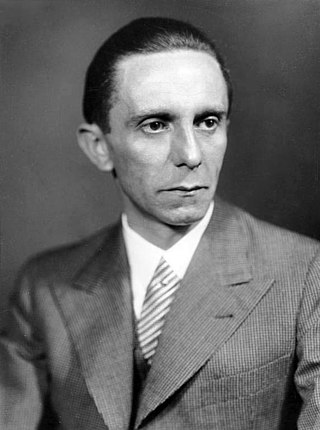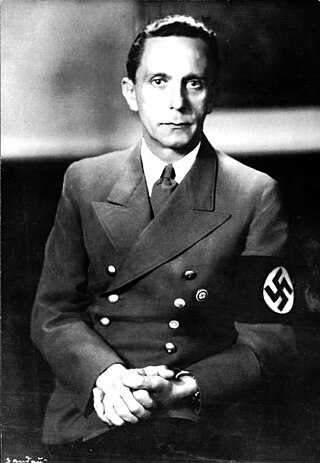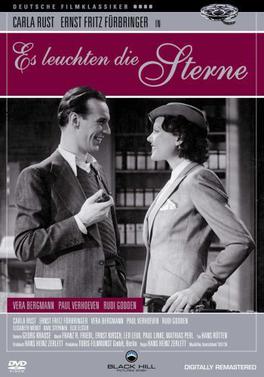Related Research Articles

Paul Joseph Goebbels was a German Nazi politician and philologist who was the Gauleiter of Berlin, chief propagandist for the Nazi Party, and then Reich Minister of Propaganda from 1933 to 1945. He was one of Adolf Hitler's closest and most devoted followers, known for his skills in public speaking and his deeply virulent antisemitism which was evident in his publicly voiced views. He advocated progressively harsher discrimination, including the extermination of the Jews in the Holocaust.

Gustav Heinrich Ernst Martin Wilhelm Furtwängler was a German conductor and composer. He is regarded as one of the greatest symphonic and operatic conductors of the 20th century. He was a major influence for many later conductors, and his name is often mentioned when discussing their interpretative styles.

NSGemeinschaftKraft durch Freude was a German NSDAP-operated leisure organization in Nazi Germany. It was part of the German Labour Front, the national labour organization at that time.

The Jazz Age was a period in the 1920s and 1930s in which jazz music and dance styles gained worldwide popularity. The Jazz Age's cultural repercussions were primarily felt in the United States, the birthplace of jazz. Originating in New Orleans as mainly sourced from the culture of African Americans, jazz played a significant part in wider cultural changes in this period, and its influence on popular culture continued long afterwards.
The music of North Korea includes a wide array of folk, popular, light instrumental, political, and classical performers. Beyond patriotic and political music, popular music groups like Pochonbo Electronic Ensemble and Moranbong Band perform songs about everyday life in the DPRK and modern light pop reinterpretations of classic Korean folk music. Music education is widely taught in schools, with President Kim Il Sung first implementing a program of study of musical instruments in 1949 at an orphanage in Mangyongdae. Musical diplomacy also continues to be relevant to the Democratic People's Republic of Korea, with musical and cultural delegations completing concerts in China and France in recent years, and musicians from Western countries and South Korea collaborate on projects in the DPRK.
"The Lambeth Walk" is a song from the 1937 musical Me and My Girl. The song takes its name from a local street, Lambeth Walk, once notable for its street market and working-class culture in Lambeth, an area of London. The tune gave its name to a Cockney dance made popular in 1937 by Lupino Lane.

The Nazi regime in Germany actively promoted and censored forms of art between 1933 and 1945. Upon becoming dictator in 1933, Adolf Hitler gave his personal artistic preference the force of law to a degree rarely known before. In the case of Germany, the model was to be classical Greek and Roman art, seen by Hitler as an art whose exterior form embodied an inner racial ideal. It was, furthermore, to be comprehensible to the average man. This art was to be both heroic and romantic. The Nazis viewed the culture of the Weimar period with disgust. Their response stemmed partly from conservative aesthetics and partly from their determination to use culture as propaganda.
Charlie and his Orchestra were a Nazi-sponsored German propaganda swing band. Jazz music styles were seen by Nazi authorities as rebellious but, ironically, propaganda minister Joseph Goebbels conceived of using the style in shortwave radio broadcasts aimed initially at the United Kingdom, and later the United States, after the German declaration of war on 11 December 1941.

World War II was the first conflict to take place in the age of electronically distributed music.

Norbert Arnold Wilhelm Richard Schultze was a prolific German composer of film music and a member of the NSDAP and of Joseph Goebbels' staff during World War II. He is best remembered for having written the melody of the World War II classic "Lili Marleen", originally a poem from the 1915 book Die kleine Hafenorgel by Hans Leip.
The Department of Film was one of five departments that comprised the Central Party Propaganda Office of the German Nazi Party (NSDAP), established by Adolf Hitler in 1933 as part of the Party's Reichspropagandaleitung. The Central Party Propaganda Office was separate from the official government Ministry of Public Enlightenment and Propaganda, although both groups were run by Joseph Goebbels. Goebbels was named Reichspropagandaleiter and given total control of Germany's press and film "for the spreading of the National Socialist world view to the entire German people" . The Department's main duty was organizing film shows "suitable for public enlightenment and education". The head of the Department of Film was Karl Neumann.

The Reich Ministry for Public Enlightenment and Propaganda, also known simply as the Ministry of Propaganda, controlled the content of the press, literature, visual arts, film, theater, music and radio in Nazi Germany.
An overview of the evolution of Jazz music in Germany reveals that the development of jazz in Germany and its public notice differ from the "motherland" of jazz, the US, in several respects.

Censorship in Nazi Germany was extreme and strictly enforced by the governing Nazi Party, but specifically by Joseph Goebbels and his Reich Ministry of Public Enlightenment and Propaganda. Similarly to many other police states both before and since, censorship within Nazi Germany included the silencing of all past and present dissenting voices. In addition to the further propaganda weaponization of all forms of mass communication, including newspaper, music, literature, radio, and film, by the State, the Ministry of Propaganda also produced and disseminated their own literature, which was solely devoted to spreading Nazi ideology and the Hitler Myth.

The Reich Chamber of Music was a government agency which operated as a statutory corporation controlled by the Ministry of Public Enlightenment and Propaganda that regulated the music industry in Nazi Germany between 1933 and 1945. It promoted "good German music" which was composed by Aryans and seen as consistent with Nazi ideals, while suppressing other, "degenerate" music, which included atonal music, jazz, and, especially, music by Jewish composers. The Chamber was founded in 1933 by Joseph Goebbels as part of the Reich Chamber of Culture, and it operated until the fall of the Nazi Germany in 1945.

The Stars Shine is a 1938 German musical revue directed by Hans H. Zerlett and written by Zerlett and Hans Hannes.
Willy Berking was a German orchestra conductor, trombonist, and composer.

Negermusik was a derogatory term used by the Nazi Party during the Third Reich to demonize musical styles that had been invented by black people such as blues and jazz. The Nazi Party viewed these musical styles as degenerate works created by an "inferior" race and they were therefore prohibited. The term, at that same time, was also applied to indigenous music styles of black Africans.

Music in Nazi Germany, like all cultural activities in the regime, was controlled and "co-ordinated" (Gleichschaltung) by various entities of the state and the Nazi Party, with Propaganda Minister Joseph Goebbels and the prominent Nazi theorist Alfred Rosenberg playing leading – and competing – roles. The primary concerns of these organizations was to exclude Jewish composers and musicians from publishing and performing music, and to prevent the public exhibition of music considered to be "Jewish", "anti-German", or otherwise "degenerate", while at the same time promoting the work of favored "Germanic" composers, such as Richard Wagner, Ludwig van Beethoven and Anton Bruckner. These works were believed to be positive contributions to the Volksgemeinschaft, or German folk community.
The Reich Music Days took place from 22 to 29 May 1938 in Düsseldorf. They were a Nazi propaganda event under the patronage of Joseph Goebbels. Goebbels had originally planned an annual return of the Reichsmusiktage. These were held again in May 1939, but ceased to exist after the beginning of the Second World War.
References
- 1 2 Kater, Michael H. (1992). Different Drummers: Jazz in the Culture of Nazi Germany. Oxford University Press. p. 127.
- 1 2 Lusane, Clarence (2002). Hitler's Black Victims: the Historical Experiences of Afro-Germans, European Blacks, Africans, and African Americans in the Nazi Era. Routledge. p. 203.
- 1 2 Cuomo, Glenn R. (1995). "The diaries of Joseph Goebbels as a source for the understanding of National Socialist cultural politics". National Socialist Cultural Policy. Palgrave Macmillan: 210.